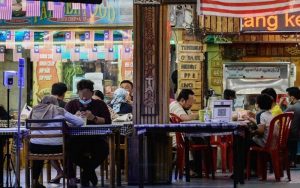Eatery owners distressed over Ramadan rules

An organisation of eatery owners has complained of distress over being expected to police Muslim patrons in Ramadan.
(FMT) – Jeremy Lim, vice-president and media liaison officer of the Restaurant and Bistro Owners Association, said it was hard for restaurateurs to determine a person’s faith in a multicultural society like Malaysia.
He told FMT he believed Muslims themselves should bear the responsibility of abiding by the law, under which they can be fined or jailed if caught eating or drinking in public during fasting hours.
Lim said eatery owners were generally aware that it was a crime to let Muslims dine inside their premises during fasting hours, but he added that some might not know how they would be punished.
“It makes more sense for the burden to sit with the consumer,” he said. “If you choose to violate the law, you should bear the repercussions.”
Last week, lawyer Nurainie Haziqah Shafii said in a Twitter post the manager of an eatery in Kuala Lumpur refused to take her dine-in order.
The post has gone viral and has led to questions on whether F&B operators have the right to refuse to take orders from Muslim patrons during fasting hours.
Different states have different rules governing daytime dining in Ramadan. In Kuala Lumpur, selling food or drinks to Muslims for immediate consumption during fasting hours is a crime under Section 15 of the Syariah Criminal Offences (Federal Territories) Act.
An F&B operator guilty of the offence can be fined a maximum of RM1,000 or jailed for six months or made to suffer both penalties. The punishment is doubled for a second or subsequent conviction.
The section provides for the same punishments on Muslims guilty of eating or drinking openly during fasting hours.
According to Malaysian Syarie Lawyers Association deputy president Moeis Basri, the authorities can take action only against F&B outlets operated by Muslims as shariah courts do not have jurisdiction over non-Muslims.
Devi’s Corner Bangsar director Dev Ananth agreed with Lim, saying restaurant owners should be concerned only with serving food and drinks.
“Our main goal is to feed our customers,” he said. “It would not be professional for us to question their faith.”
Dev said he understood that Muslims could skip fasting for reasons such as illness and menstruation, but he advised them to opt for takeouts during fasting hours.
Another F&B operator who wished to remain anonymous said his business had a “no-questions-asked” approach.
“If our Muslim customers do not feel comfortable about eating openly, we would offer to seat them in a less visible area,” he told FMT.
“It’s not our place to pass moral judgment.”

